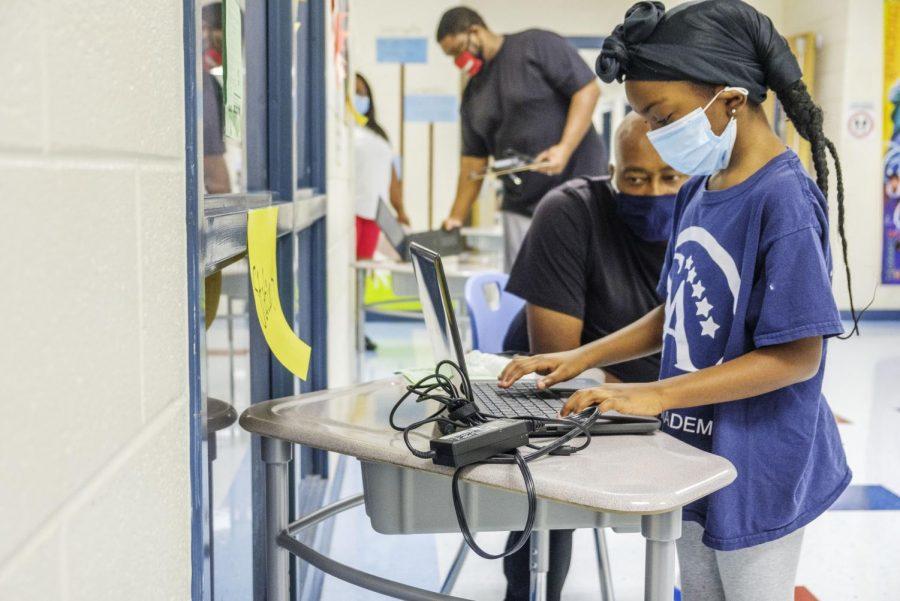
Caption
Bibb County students, like this student at Heritage Elementary school, were given laptops for at home, virtual school beginning in August.
Credit: Grant Blankenship/GPB News

Bibb County students, like this student at Heritage Elementary school, were given laptops for at home, virtual school beginning in August.
Macon-Bibb County Commissioner Virgil Watkins made his point about inequities in internet access without saying a word Tuesday night.
Watkins’ video froze on a Zoom call just as he wanted to speak about overriding a veto that canceled $765,000 in funding to create better web learning access for public school students during COVID-19.
“I don’t think he’s hearing very well,” Commissioner Bert Bivins remarked during the commission’s online meeting.
“Commissioner Watkins, your screen keeps freezing,” communications specialist Rachel Gambill told him.
“Yeah, I’m not having good internet at all here today,” Watkins said before abandoning the computer in favor of his telephone to make his points.
There was discussion about whether the technology upgrades are still needed as students are heading back to the classroom.
In a 5-4 vote at the Oct. 20 meeting, commissioners approved Watkins’ proposal to spend up to $765,000 to buy 1,125 Wi-Fi hotspots with unlimited data for six months, 1,100 web cameras and 22,000 durable headphone units to provide more equitable remote learning opportunities for Bibb County public school students sent home during the pandemic.
When Watkins proposed the spending, it was understood that the funds would be reimbursable through the Coronavirus Relief Fund guidance provided by the Georgia Governor’s Office.
During that Oct. 20 meeting, assistant county manager Julie Moore informed commissioners that no Phase II CARES Act funding would be coming as Gov. Brian Kemp shifted $1.5 billion into the state’s unemployment insurance trust fund to keep from raising state and federal unemployment taxes.
“I know you’re considering some issues tonight and probably next week about money that could be spent. That money will be coming from the general fund,” Moore told them.
After debate that included Commissioner Mallory Jones stating he was told that the school district had the necessary funds, commissioners passed the funding only to have the mayor veto the spending.
In a recent letter to commissioners announcing the veto, Mayor Robert Reichert not only cited the lack of new CARES funding but mentioned the pending return to in-class learning this month.
“With many of the children returning to the classroom, that would make the purchase of additional equipment unnecessary,” the letter stated.
Bibb School District spokeswoman Stephanie Hartley stated in a Thursday email that all the equipment is still needed as teachers will have both in-person and virtual students at the same time. The district is moving to one-to-one technology which provides an electronic device and equipment to each student, which makes the headsets a priority, she said.
“The CARES funding was a way for us to fund these headsets, which we believe are necessary,” Hartley stated. “Now that the CARES funding will not be available, the District will go into our reserves to pay for these items.”
The district also still needs the webcams for teachers and Wi-Fi hotspots with six months of data service which “will help support needs of students who are remaining virtual,” she said.
Commissioner Elaine Lucas, a member of the Macon-Bibb County Board of Health who voted for the funding, has reservations about kids going back to class.
“I’m very, very nervous about the school system reopening in the next couple of weeks,” she said Tuesday.
Watkins understood the mayor’s point that school is resuming but also tried to override the veto.
“Those families that never got access to internet, they can’t wait to go back because they can’t log in successfully. But we’re putting them, the most vulnerable folk, right back into the hornet’s nest of danger in the pandemic,” Watkins said.
Bivins equated the situation to inequities he faced during civil rights struggles of the ’50s.
“With the things that are going on with COVID, it seems to go up and down. There’s a good possibility that they may still need some funding or need some kind of assistance,” Bivins said. “I’m always disappointed when it comes to these, what I call 1955 issues, we are always quick to deal with it in a negative manner.”
Commissioners Jones and Valerie Wynn said they supported students having the necessary tools, but understood the school system, which got its own CARES funding, could afford it.
“I really don’t see that they need this money and we can use this money somewhere else” Wynn said.
Commissioner Joe Allen didn’t support the spending because it did not include private school students whose parents struggle to make ends meet and can’t afford technology upgrades.
“If we’re going to do this and leave the private schools out… I’d rather put the money back in the fund balance and take care of our commitment to our employees in law enforcement,” said Allen, citing funding the pending pay scale enhancements up for discussion next week.
Allen also supported tabling last month’s discussion to allow a school district representative to explain the needs, but that measure failed.
The same five commissioners who voted for the funding last month – Watkins, Lucas, Bivins, Larry Schlesinger and Mayor pro tem Al Tilman – also voted to override the veto.
A super-majority of six commissioners is needed to override a veto, so the veto stands.